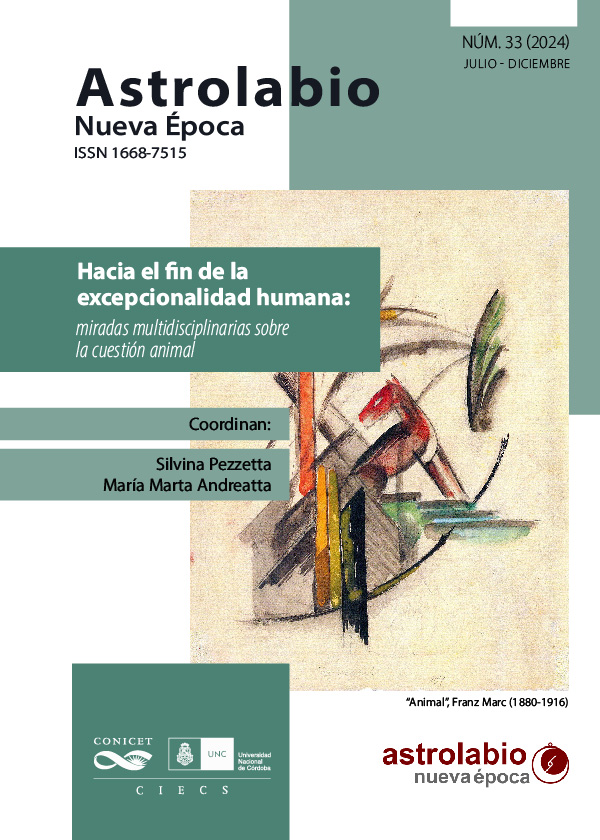Hearts of Iron: Neo-Darwinists against Darwin? Disputes about Anthropocentrism and Progress in 20th Century Evolutionary Biology
Main Article Content
Abstract
In fundamental works such as On the Origin of Species (1859), The Descent of Man (1871) and The Expression of the Emotions in Man and Animals (1872), as well as in minor writings, Charles Darwin established a clear anti-anthropocentric position based on the evolutionary continuity between animals and humans, and between all organisms, including the human species. Nevertheless, several theorists of the modern evolutionary synthesis reinstated anthropocentrism within the theory of evolution, even at the expense of foundational Darwinian ideas. I will analyze the case to try to understand how what has been called the “second narcissistic wound” inflicted by Darwin on humanity operates in this attempt to make biology and anthropocentrism coincide in the twentieth century, against the thought of the father of biology. To understand contemporary anthropocentrism, we will follow some clues to know how, in our culture, there is an antinomy between two ideas produced at different moments of intellectual history: either that man is the center of nature or the exact opposite idea, escaping in certain aspects to his biology through exceptionality. Precisely, the thesis of biological continuity presented by Darwin is one of the most important marks of the epistemological revolution that bears his name, and yet the heirs of his revolution betray this thesis.
Downloads
Article Details

This work is licensed under a Creative Commons Attribution-NonCommercial-ShareAlike 4.0 International License.
Astrolabio, Nueva Época está protegida bajo licencia Licencia Creative Commons Atribución-NoComercial-CompartirIgual 4.0 Internacional. La propiedad intelectual de los artículos pertenece a los autores y los derechos de edición y publicación a la revista. Los artículos publicados podrán ser usados libremente para propósitos científicos y académicos, siempre y cuando se realice una correcta citación de los mismos. Cualquier persona física o jurídica que desee reimprimir parte o la totalidad de algún artículo, deberá obtener permiso escrito de los editores de Astrolabio Nueva Época, quien lo otorgará con el consentimiento del autor.
References
ANGENOT, M., (2010). El discurso social. Buenos Aires: Siglo XXI.
ANZOÁTEGUI, M. (2017). Vida precaria y duelo: reapropiaciones para un abordaje no-antropocéntrico de Judith Butler. En M. L. Femenías (coord.), Judith Butler fuera de sí; pp. 139-160. Rosario: Prohistoria.
ANZOÁTEGUI, M. (2019). “Contra la inmunización epistémica: la interdisciplina entre filosofía y ciencias de la vida”. Ludus Vitalis, 27-52, 123-128.
ANZOÁTEGUI, M. (2020). “Antropocentrismo”. Interinsular: ciencia, derecho, filosofía y animales. Video disponible en: https://interinsularong.wixsite.com/interinsular/videos [consulta: febrero de 2024].
ANZOÁTEGUI, M. (2021a). “La mente animal a través del espejo antropocéntrico de la naturaleza”. Instantes y Azares, 26, 61-82.
ANZOÁTEGUI, M. (2021b). La noche del antropocentrismo: excepcionalidad humana vs. continuidad evolutiva. Tesis de Doctorado en Filosofía, Universidad Nacional de La Plata.
ANZOÁTEGUI, M. (2022). “Contra la trampa del antropocentrismo: su crítica contemporánea como construcción de sentido, sesgo epistemológico y supuesto de inevitabilidad”. RLECA, 9 1, 433-481.
ARSUAGA, J. y MARTÍNEZ, I. (2000). La especie elegida. Madrid: Planeta.
BUSS, D. (2021). Evolutionary Psychology: The New Science of the Mind. New York: Routledge.
CORDÓN, F. (2007). Prólogo. En C. Darwin, El origen de las especies, pp. 9-14. Madrid: Edaf. (Edición original, 1980.)
DROZ, L. (2022). “Anthropocentrism as the scapegoat of the environmental crisis: a review”. Ethics in Science and Environmental Politics, 22, 25-49.
FERRARI, H. R. y ANZOÁTEGUI, M. (2023). Guidelines for a Post-speciesist Epistemology in the Age of Anthropocene. En L. Weir (ed.), Philosophy as Practice in the Ecological Emergency: An Exploration of Urgent Matters, pp. 185-205. Cham, Switzerland: Palgrave Macmillan.
FREUD, S. (1979). Una dificultad del psicoanálisis. En Obras completas, XVII, 129-135. Buenos Aires: Amorrortu. (Edición original, 1917.)
GONZÁLEZ, A. G. (2019). “Lecturas animales de las vidas precarias. El «discurso de la especie» y las normas de lo humano”. Tabula Rasa, 31, 139-159.
GONZÁLEZ, A. G. (2021). “Políticas feministas de la animalidad. Decolonialidad, discapacidad y antiespecismo”. Instantes y Azares, 6, 123-146.
GONZÁLEZ, A. G. (2024). Furious and ferocious forms. A cartography of antispeciesist and posthumanist transfeminisms from the Global South”. En C. Taylor (ed.), The Routledge Companion to Gender and Animals, pp. 344-361. New York: Routledge.
GOULD, S. J. (1977). Ever since Darwin. New York: Norton.
GOULD, S. J. (1983). Desde Darwin. Madrid: Ediciones Hermann Blume.
GOULD, S. J. (1999). La vida maravillosa. Barcelona: RBA.
HARARI, Y. (2014) Sapiens, de animales a dioses. Breve historia de la humanidad. Buenos Aires: Debate.
LANDAU, M. (1984). “Human evolution as narrative: have hero myths and folktales influenced our interpretations of the evolutionary past?”. American Scientist, 72-3, 262-268.
LANDAU, M. (1993). Narratives of human evolution. New Haven - London: Yale University Press.
LÁZARO, L. C. y FERRARI, H. R. (2020). “Antrozoología de la cognición: igualando las diferencias”. Calidad de Vida y Salud, 13, 126-143.
RENSCH, B. (1987). Homo sapiens. De animal a semidiós. Madrid: Alianza
SCHAEFFER, J. M. (2009). El fin de la excepción humana. Buenos Aires: FCE.
SIMPSON, G. G. (1987). El sentido de la evolución. Buenos Aires: Eudeba. (Edición original, 1949).

